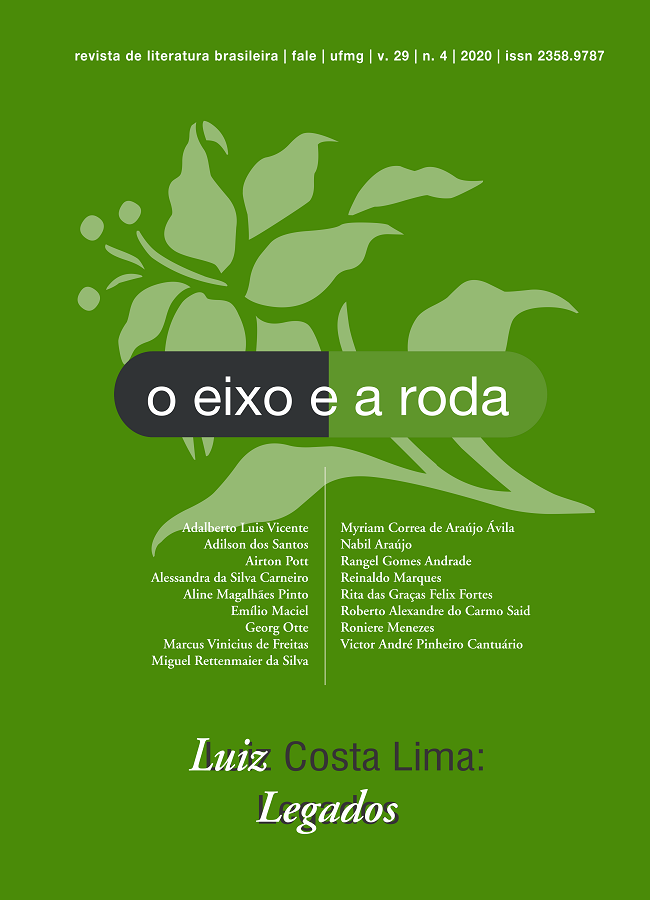The Blade of Letter
Luiz Costa Lima, A Spoken-Writing and the Poetics of João Cabral
DOI:
https://doi.org/10.17851/2358-9787.29.4.98-117Keywords:
Luiz Costa Lima, criticism, spoken language, João CabralAbstract
This paper aims to reflect upon the critical essays by Luiz Costa Lima in which the author analyzes the strange place of a Brazilian or Latin-American intellectual. Working from a place that is not auspicious to the demands of writing or to the analytical efforts and being highly influenced by spoken language and overstated rhetorics, the intellectual or writer from the tropics usually feel as foreigners facing their work in their own land. They often choose to write similarly to spoken language in order to establish a more effective communication with their audience. We are going to analyze Costa Lima’s positioning towards this topic, emphasizing the author’s concepts of improvisation and auditivity. We are going to work with the books Dispersa demanda: ensaios sobre literatura e teoria (1981), Pensando nos trópicos (1991) and Frestas: a teorização em país periférico (2013). As a conclusion, we are going to demonstrate how Costa Lima’s ideas shift from the texts when considering the Brazilian thinking and literary criticism. We are going to take as an example his analyses of poems by João Cabral de Melo Neto presented in the essay “A traição consequente ou a poesia de Cabral”, from the book Lira e antilira: Mário, Drummond e Cabral (1968) and Dispersa Demanda: ensaios sobre literatuar e teoria (1981). We aim to show that studies on improvisation and auditivity are important analytical models. The texts present useful tools that help us better understand the culture and the literary production of the country.
References
ANDRADE, Carlos Drummond de. Poesia completa. Fixação de textos e notas de Gilberto Mendonça Teles. Introdução de Silviano Santiago. Rio de Janeiro: Editora Nova Aguilar, 2002.
ANDRADE, Mário de. O banquete. 2. ed. São Paulo: Livraria Duas Cidades, 1989.
BANDEIRA, Manuel. Libertinagem & Estrela da manhã. 5. ed. Rio de Janeiro: Ed. Nova Fronteira, 2000.
CANDIDO, Antonio. Literatura e sociedade: estudos de teoria e história literária. São Paulo: Cia. Editora Nacional, 1973.
CANDIDO, Antonio. Literatura e sociedade: estudos de teoria e história literária. 8. ed. São Paulo: T.A. Queiroz Editor, 2000.
DIAS, Laís de Pinho. Luís Costa Lima nas malhas da crítica. 2012. 123f. Dissertação (Mestrado em Letras) – Instituto de Letras, Universidade Federal da Bahia, Salvador, 2012.
FREITAS, Eduardo da Silva. Intelectualidade, literatura e crítica literária brasileiras na reflexão de Luiz Costa Lima. In: CONGRESSO INTERNACIONAL DA ABRALIC, 15., 2017, Rio de Janeiro. Anais[...], Rio de Janeiro: ABRALIC, 2017. p. 5226-5237.
LIMA, Luiz Costa. Dispersa demanda: ensaios sobre literatura e teoria. Rio de Janeiro: Francisco Alves, 1981.
LIMA, Luiz Costa. Frestas: a teorização em país periférico. Rio de Janeiro: Contraponto: Editora PUC-Rio, 2013.
LIMA, Luiz Costa. Lira e antilira: Mário, Drummond, Cabral. Rio de Janeiro: Civilização Brasileira, 1968.
LIMA, Luiz Costa. Pensando nos trópicos. Rio de Janeiro: Rocco, 1991. (Dispersa demanda II),
MELO NETO, João Cabral. Obra completa. Organização de Marly de Oliveira. Rio de Janeiro: Nova Aguilar, 1999.
MENEZES, Roniere. O traço, a letra e a bossa: literatura e diplomacia em Cabral, Rosa e Vinicius. Belo Horizonte: Ed. UFMG, 2011.
RAMOS, Graciliano. Memórias do cárcere. Rio de Janeiro: Record, 2008.
SOUZA, Eneida Maria de. Luiz Costa Lima: crítica em palimpsesto. Cadernos de Pesquisa, Belo Horizonte, n. 7, p. 12, nov. 1992.










